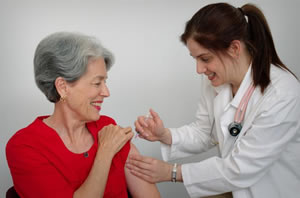
August is National Immunization Awareness Month, and the week of August 16–22 focuses on adult vaccinations.
The National Public Health Information Coalition sponsors this event to call attention to the importance of immunizations for adults. Their “Vaccines are not just for kids” campaign reminds us that seniors in particular are at higher risk of serious complications from a number of preventable diseases. Yet many seniors still fail to be immunized for the flu, shingles, pneumonia, tetanus and other diseases that can cause, at the very least, a miserable period of illness—and often, disability and even death.
Recently, the Alliance for Aging Research (www.agingresearch.org), a nonprofit organization dedicated to healthy aging, released a new report, Our Best Shot: Expanding Prevention through Vaccination of Older Adults. “Vaccinations are available for many of the most common and deadly infectious diseases in older Americans and can save countless lives and health care dollars,” said Alliance president and CEO Susan Peschin, MHS.
The report took a look at why seniors fail to be vaccinated, and made recommendations about how our public health and other agencies can promote full immunization of people older than 65.
Among the reasons seniors do not receive the recommended vaccines: they may not understand the need for vaccines or which shots are recommended; they may be unable to afford the cost of vaccines or a copay, or might be unaware that these vaccines are covered by Medicare; and they may not be under the care of a healthcare provider who encourages and enables them to get their shots.
Said Peschin, “We think there is lot of low-hanging fruit—in promotion of existing preventive health services, access and administration policies, and financial strategies—that would increase utilization and improve public health for older adults. We need to raise the level of importance of immunization among seniors to the level we currently have for children, and then we need to make some basic changes to support it.”
You can read the entire report here.
What immunizations are recommended for older adults?
Here are the vaccines recommended by the CDC and the U.S. Food and Drug Administration for most older adults. Of course, you should consult your healthcare provider before receiving any vaccines, and about which form of each vaccine is best for you.
Influenza (Flu). Seniors are at high risk of complications and even death from the flu. Get your annual flu shot as soon as the vaccine is available in your area. Ask your doctor which flu shot you should receive.
Pneumonia (Pneumococcal Disease). This disease can lead to serious infections of the lungs, blood and brain. One dose is recommended for all adults age 65 and older.
Tetanus/Diphtheria/Pertussis. Tetanus (sometimes called “lockjaw”) and diphtheria are severe, often fatal diseases. Pertussis (“whooping cough”) causes spasms of severe coughing. The vaccines for these three diseases are given in different combinations; consult your healthcare provider about the type that is recommended for you.
Shingles (herpes zoster). Shingles causes a painful skin rash, and can lead to long-term pain and disability. All adults 60 years old or older should get the shingles vaccine.
The CDC also recommends additional vaccines for people with certain health problems, immunization histories and lifestyles. These vaccines include the Measles/Mumps/Rubella (MMR) shot, vaccinations for Hepatitis A and B, and for Meningococcal disease. Your doctor can tell you if you should receive any of these immunizations.
Vaccines are safe. The CDC says, “Vaccines are thoroughly tested before licensing and are carefully monitored even after they are licensed to ensure that they are very safe.” Side effects and allergies are rare and usually temporary. Talk to your healthcare provider about the vaccines that are right for you based on your age, health, lifestyle, occupation and other factors.
Learn More
Find an online, recently updated booklet about adult vaccines from the National Public Health Information Coalition (www.nphic.org/niam-adults).
Source: IlluminAge AgeWise, 2015, reporting on materials from the Alliance for Aging Research and the National Public Health Information Coalition.
No comments:
Post a Comment